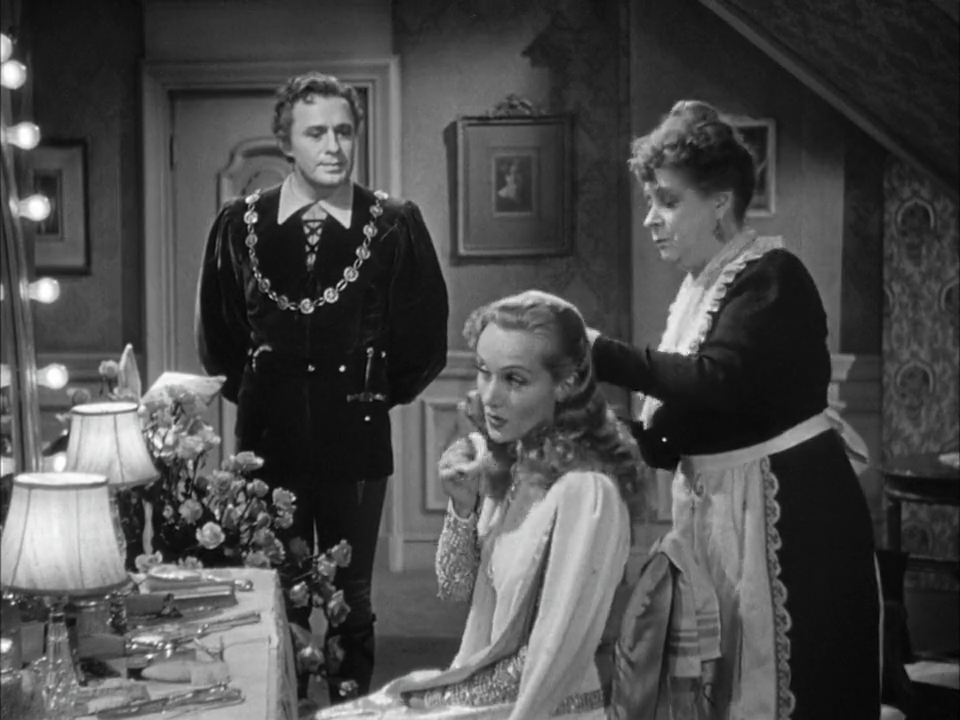A Century of Film is an ongoing series where Devin Wilger watches one movie from each year between 1917 and today. For the year of 1942, it’s To Be or Not To Be.
Ernst Lubitsch was one of the early superstar directors, to the point where a marketing department somewhere coined the phrase “the Lubitsch touch” to refer to the special quality that his films had. It is naturally going to be impossible to say what the Lubitsch touch actually was if, like me, you’ve only seen one of his films. But then again, maybe that film is good enough that you know that the touch must exist, entirely because of the quality of the film. To Be or Not To Be is a film that might be great, but could have easily gone wrong, as it’s a mix of serious war film and wacky farce, and managing the tone of it is a high wire act that only a deft hand could possibly manage. That Lubitsch pulled it off is an indication that a Lubitsch touch is real, and that I would quite like to see more of his work.
There is nothing easy about To Be or Not To Be, a farce about a group of actors who accidentally become a group of spies, in Nazi-occupied Poland, filmed and released in 1942. It satirizes the Nazis while always keeping the audience keenly aware of the threat they represent. It pulls laughs out of an attempted suicide, but knows well enough to recognize when a scene should not have a joke. It’s a very silly movie about a very serious subject, and that it works incredibly well as both an intense spy caper and a silly laugh is an incredibly difficult trick to pull off, especially given the environment it was made in. At the time, it was even considered poor taste, and maybe it is, but taste really isn’t all that important when it comes to art, is it?
We open with Hitler wandering around Warsaw in 1939, which leads to a scene where a child receives a toy tank from Nazis in order to stop his dad from telling people Hitler’s going to get cheese named after him, and the great line “Heil myself.” Then we pull back, it’s a play called Gestapo, and the earlier Hitler is an actor trying to make a point. The introduction exists to set up some handy coincidences, a pretty standard plot point among spy farces, and introduces us to our friends for the remainder of the film, a troupe of theatre actors lead by the husband and wife duo of Joseph and Maria Tura (Jack Benny and Carole Lombard), he an egotistical ham, she apparently the most attractive woman in all of Poland - the plot is built around every man in town being smitten with her charms. In fact, those charms start the complications immediately, as Lieutenant Sobinski (Robert Stack) is sending her flowers and wants to meet her. The company, apart from producing Gestapo, is also doing Hamlet, and she tells him to meet her in her dressing room at the start of the big soliloquy. That he leaves during her husband’s big moment is a bigger insult to him than any affair.
War soon intervenes. Sobinski accidentally uncovers a spy plot because he can’t believe Professor Siletsky (Stanley Ridges) hasn’t heard of Maria - though there’s a running gag that nobody has heard of the Turas, much to Joseph’s dismay - and the actors must unleash an outlandish plot to ensure that the Polish underground isn’t destroyed by the professor’s intel. Joseph, famous for being a ham, has to play two different Nazis, Colonel Ehrhardt (Sig Ruman) and the professor. This is the setup for several great jokes, the best being when the one choice that rumbles him to the professor is the one detail he gets absolutely, completely right about Ehrhardt (constantly laughing about being called “Concentration Camp Ehrhardt”).
There are so many great running gags, some of which even have powerful payoffs - Greenberg (Felix Bressart) is constantly saying things will be a great laugh and has a desire to play Shylock, but his chance to actually be Shylock doesn’t get a laugh and is really a heartbreaking scene. The film mines a lot out of repetition and callbacks, catchphrases and wordplay. It never feels repetitive, even as the same line is said repeatedly. Some comedy dies in repetition, but each recurring gag here just makes the line funnier, because the film tends to make lines and moments drop in surprising ways. It’s such a well constructed scenario, intelligently silly, but not flippant. It manages the impossible trick of making the tone twist on a dime without it feeling weird or unnatural. Silly people caught in the middle of a serious situation, and always aware of how serious that situation is, there are rarely any laughs when people believe they’re in real danger.
It would have been very easy for this entire enterprise to go very wrong, and Lubitsch might have been one of the only directors who could have pulled it off - possibly the only one working in 1942, though I think the Coen brothers have inherited Lubitsch’s skill for mixing silly and serious they were an entire decade away from even existing. It takes a deft touch to keep all of these plates spinning in the air while balancing the tone properly. A Lubitsch touch, if you will.
Next time, it’s 1943, and I Walked With a Zombie.



